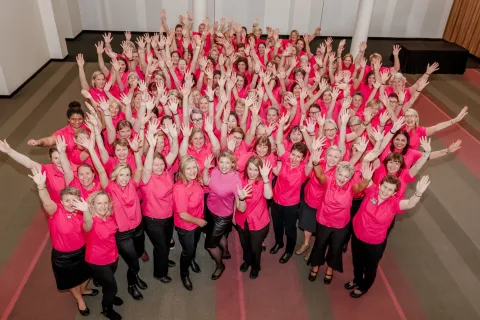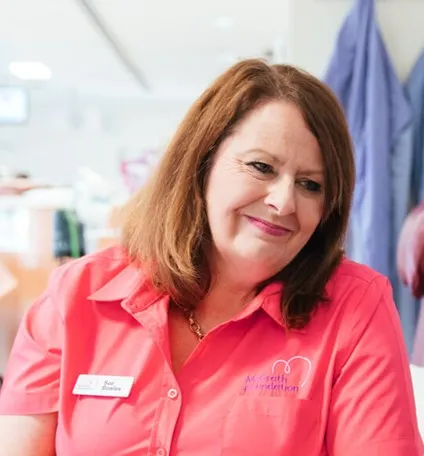Developing MBC e-Learning materials for Australian nurses to improve patient care

Context
Patients and their families in Australia have reported that the information and care they received upon their diagnosis with metastatic breast cancer (MBC) was inadequate compared to the services they received at an earlier-stage diagnosis.[1] Metastatic patients and their families face uncertainty and often are coping with the emotional impact of a life-threatening diagnosis, existential distress as well as a loss of control.[2][3] Nurses can play a vital role in the wellbeing of people diagnosed with MBC. The McGrath Foundation sought to address this lack of support for MBC patients and their families in Australia through developing e-learning modules on MBC for the professional development of their 135 McGrath Breast Care Nurses.
The McGrath Foundation’s vision is to ensure that every family experiencing breast cancer in Australia has access to the specialist support and care of a McGrath Breast Care Nurse, no matter where they live, for free.
Project description

In 2017, the McGrath Foundation was awarded a SPARC MBC Challenge grant, for their e-Learning project. This project aimed to enhance the professional development of McGrath breast care nurses by creating a series of e-Learning materials on MBC available through their online nurse portal.
Throughout the development of the modules, the McGrath Foundation collaborated with MBC experts to ensure the quality of the content. The e-Learning portal was built on Moodle and integrated within the McGrath Foundation CRM framework, which allowed them to measure usage and engagement. Data analytics obtained included logins, module activity, time spent on the e-learning system, number of courses completed, video views and test results. The information gathered provided a comprehensive view of the nurses’ learning activity, skill level and qualifications, which supported the development of further curricula. The flexibility of the online platform permits the Foundation to regularly review the e-Learning materials and update them to reflect current treatments and evidence-based practice.
Impact
The McGrath Foundation successfully reached their goal, for all McGrath Breast Care Nurses to have completed the MBC e-Learning modules by the end of 2019. Since its development, the MBC e-Learning curriculum has received official continuing professional development accreditation. Prior to its launch, some McGrath Breast Care Nurses who had less experience in caring for MBC patients expressed that they did not always feel competent to care for these complex cases, however, now nurses have reported that the e-learning modules provided them with the knowledge to confidently tailor care plans to meet individual requirements and thereby helping patients cope better. This includes, but is not limited to, providing appropriate interventions such as counselling, information, and referral to other health services.
The MBC modules have been made available to the entire McGrath Foundation workforce and, with the added support of a SPARC top-up grant, the Foundation held an MBC consultation workshop in August 2019. The consultation session was attended by an expert reference group comprised of health service professionals from across Australia. The expert group reviewed the Model of Care to ensure it represents best practices across the continuum of breast cancer care, particularly the MBC support component.

“As a metastatic breast cancer nurse, the information provided in the metastatic e-Learning modules is so comprehensive in giving insight as to what metastatic breast cancer is and the complications that a patient may experience. The way it is presented is easy to understand and can definitely be utilised as a teaching tool for those that want more information and understanding of the complexities of metastatic breast cancer.”
Samantha Moules, McGrath Breast Care Nurse, North Sydney NSW
The McGrath Foundation hopes that this training has made an impact on patient outcomes, as well as on the health services in which their nurses are employed. They are currently working on developing a national model of breast cancer care for nurses across the country, to improve the quality of life of MBC patients and their families in Australia.
More
Organisation's website: The McGrath Foundation
References
[1] Watts K, Meiser B, Conlon H, et al. A specialist breast care nurse role for women with metastatic breast cancer: enhancing supportive care. Oncol Nurs Forum. 2011;38(6):627–631. doi:10.1188/11.ONF.627-631
[2] Kenne Sarenmalm E, Thorén-Jönsson AL, Gaston-Johansson F, Ohlén J. Making sense of living under the shadow of death: adjusting to a recurrent breast cancer illness. Qual Health Res. 2009;19(8):1116–1130. doi:10.1177/1049732309341728
[3] Warren M. Uncertainty, lack of control and emotional functioning in women with metastatic breast cancer: a review and secondary analysis of the literature using the critical appraisal technique. Eur J Cancer Care (Engl). 2010;19(5):564–574. doi:10.1111/j.1365-2354.2010.01215
(Information from the project description and context is compiled from the SPARC reports)
Last update
Friday 03 February 2023